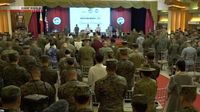China has voiced strong opposition to the ongoing joint military drills between the United States and the Philippines, asserting that these exercises undermine regional stability. The annual "Balikatan" military exercise, which commenced on April 21, 2025, will see participation from approximately 18,000 troops from both nations, running through May 9 in the strategically significant Luzon Strait.
Chinese Foreign Ministry spokesman Guo Jiakun remarked, "The Philippines, in collusion with external countries, has been conducting large-scale military exercises, introducing and deploying strategic and tactical weapons, undermining regional strategic stability, and jeopardizing the region’s economic growth prospects." His comments came in response to a Filipino military general's assertion that Manila views the Balikatan exercises as a crucial rehearsal for national defense.
The drills, described as the "Super Bowl" of military exercises in the Asia-Pacific region, are taking place amid escalating tensions in the South China Sea and around Taiwan. The exercises include live-fire defense training simulating missile attacks and amphibious landing operations designed to enhance operational coordination between the two military forces.
At the opening ceremony held at Camp Aguinaldo in Quezon City, Gen. Romeo Brawner, chief of staff of the Armed Forces of the Philippines, emphasized the importance of the drills, stating, "This exercise embodies unity in strength and heralds a promise of peace through preparedness." The Balikatan, which translates to "shoulder to shoulder" in Filipino, highlights the commitment of both nations to strengthen their military alliance.
In a significant development, the US military is deploying advanced weaponry, including the NMESIS anti-ship missile system and unmanned surface vessels, marking their inaugural deployment in the Philippines. This missile system boasts a range of over 180 kilometers (approximately 112 miles) and is mounted on an unmanned vehicle, enhancing the operational capabilities of the US forces in the region.
During the opening ceremony, US Marine Corps Lt. Gen. James Glynn stated, "We will demonstrate not just our will to uphold our mutual defense treaty in existence since 1951 but our matchless capability to do so." The presence of a US Marine Corps regiment equipped with Naval Strike Missiles further underscores the growing military cooperation between the two nations.
Maj. Gen. Francisco Lorenzo of the Philippines reiterated the importance of the drills, stating that they would bolster the country's ability to address contemporary security challenges. The participation of additional countries, including Australia and Japan, signals a broader regional concern over China's military assertiveness.
China's response to the Balikatan exercises has been particularly pointed, with Guo Jiakun warning that the Philippines' collaboration with external forces has positioned it in direct opposition to regional countries, provoking strong resentment. He emphasized that "the Taiwan question is purely a matter of China’s internal affairs and is the core of China’s core interests." Guo urged Manila and Washington not to provoke tensions over Taiwan, cautioning that "those who play with fire will inevitably burn themselves."
The Balikatan exercises come at a time when the US administration has been increasingly vocal about its commitment to countering China's growing influence in the Indo-Pacific region. US Defense Secretary Pete Hegseth, during his visit to the Philippines last month, underscored the need for necessary deterrence against Chinese aggression.
As the drills progress, the Philippines and the US aim to enhance their military readiness and interoperability, particularly in the face of potential threats from China. The live-fire training and amphibious operations are designed to prepare both forces for a range of scenarios in the contested waters of the South China Sea.
Despite the strong rhetoric from Beijing, the US and Philippine forces remain committed to their joint military exercises, viewing them as essential for maintaining regional security and stability. The Balikatan drills not only serve as a platform for military collaboration but also reinforce the longstanding alliance between the two nations.
As the Balikatan exercises unfold, the geopolitical landscape in the region is likely to remain tense, with both sides closely monitoring each other's movements. The drills may serve as a litmus test for the US-Philippines alliance in the face of rising challenges posed by China.
In summary, the Balikatan military exercises reflect the ongoing strategic dynamics in the Asia-Pacific region, where military readiness and alliances are being tested against the backdrop of increasing tensions with China. The outcomes of these drills could have significant implications for regional security and the future of US-Philippine relations.




